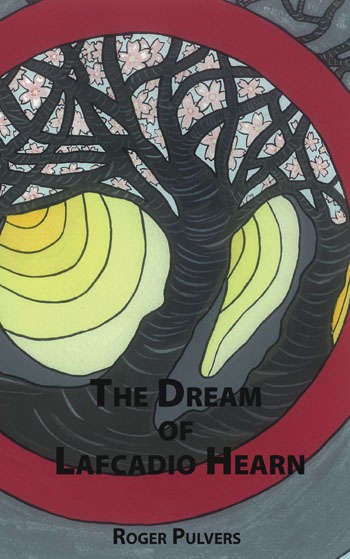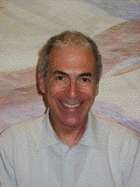The Dream of Lafcadio Hearn
Author: Roger Pulvers, Emeritus Professor of Tokyo Institute of Technology
When Published: 2011
Publisher: Kurodahan Press - Book No. FG-JP0031-L37
Available: Through most book shops
Description: English
220 pages
Trade paperback 5" x 8" (127mm x 203mm)
ISBN-13: 978-4-902075-41-0
ISBN-10: 4-902075-41-5
List Price: US$14.00
Cover: Alice Pulvers
The Dream of Lafcadio Hearn has also been published in Japanese translation by Kodansha.

About the author

Roger Pulvers, author, playwright, theatre director and translator, has published novels including The Death of Urashima Taro, General Yamashita's Treasure and The Honey and the Fires. He has also published numerous works of nonfiction, including his autobiography, The Unmaking of an American.
Born in New York and raised in Los Angeles, he arrived in Japan in the summer of 1967. He taught Russian and Polish in Kyoto for five years, before going to Australia to lecture in Japanese at the Australian National University in Canberra.
Among his many published or produced translations are the works of Miyazawa Kenji, Inoue Hisashi , S. I. Witkiewicz, and Nikolai Gogol.
Roger's plays have been performed extensively in Australia, Japan and the U.S. He has twice directed at the Adelaide Festival of Arts; and in Japan has worked with such actors as Kishida Kyōko, Fujita Makoto and Emoto Akira. He was assistant director to Oshima Nagisa on "Merry Christmas, Mr. Lawrence," and won the Crystal Simorgh Prize for Best Script at the 27th Fajr International Film Festival in Tehran for "Ashita e no Yuigon." He was also awarded the Miyazawa Kenji Prize in 2008.
He is currently head of the Center for the Study of World Civilizations at Tokyo Institute of Technology.
From the publisher:
“This fascinating fictional account of the life and times of Lafcadio Hearn probes the question: "What was the nature of this man, born wanderer, informant of the fiendish details of Japanese lore ... a man who chose to live his life 'in defiance of the season'?"
“The Dream of Lafcadio Hearn is a novel not only about Hearn in Meiji Japan but about any person in any era who may feel, for a time or forever, more at home in a foreign land than in their own. The novel is preceded by a detailed introduction on Hearn from the time of his birth in Greece in 1850 until his death in Japan in 1904.”
This fascinating fictional account of the life and times of Lafcadio Hearn probes the question: "What was the nature of this man, born wanderer, informant of the fiendish details of Japanese lore ... a man who chose to live his life 'in defiance of the season'?"
Though now largely forgotten in the West, he is, in the 21st century, still considered by the Japanese to be the foreigner with the most insight into their mind and mores.
Orphan of Europe, chronicler of the eerie and the grotesque, journalist and ethnographer of subcultures, Greek-Irish author Lafcadio Hearn arrived in Yokohama from the United States in 1890. During his 14-year stay in Japan he wrote 14 books about the country, becoming known, in the decades succeeding his death, as the foremost interpreter of things Japanese in the West.
The Dream of Lafcadio Hearn is a novel not only about Hearn in Meiji Japan but about any person in any era who may feel, for a time or forever, more at home in a foreign land than in their own. The novel is preceded by a detailed introduction on Hearn from the time of his birth in Greece in 1850 until his death in Japan in 1904.
Reviews
•"Roger Pulvers has spun a highly readable and enjoyable portrayal of an unconventional man who embraced Japan in a time of transition, and who struggled intellectually and emotionally to come to grips with sweeping change."
—Mark Schreiber, Japan Times Online
•"Roger Pulvers' novel was so intriguing that it left me breathless. It has a reality as if written by Hearn himself."
—Tamaki Masayuki, Nami (in Japanese)
•"The novel brings out the clash between Hearn's idealized vision of a society rooted in ancient lore of the grotesque, the macabre and the quaint, and the thrust of industrialization and war that was transforming a rising imperial power. Drawing on his experience of immersion in Japanese literary, theatrical and filmic life for much of the last forty years, Pulvers limns the extraordinary life and times of Lafcadio Hearn."
Review by Japan Times
Sunday, June 12, 2011
Eccentric wanderer discovers his destiny in Meiji Japan
By MARK SCHREIBER
"Japan," asserts the fictitious character Lafcadio Hearn on page 97, "has chaos at its core. The closer one approaches that core, the deeper one fathoms the world of illusion and warped contradiction. Such a country is begging for citizens such as Yakumo Koizumi, that is, me."
What kind of egotist would make such outrageous assertions, and why would he be worth reading about?
As Australian novelist, playwright and theater director Roger Pulvers explains in his introduction, "Hearn was a story reteller of genius, a writer with an instinctive knack of grasping a foreign culture's spirituality, legends, rituals and myths."
Best known for "Kwaidan: Stories and Studies of Strange Things" and other adoptions of traditional Japanese ghost stories, Irish-Greek author Patrick Lafcadio Hearn (1850-1904) arrived in Japan in 1890, worked at various jobs, including journalism and teaching, and while struggling with a variety of physical ailments managed to produce over a dozen books by the time he died at 54.
Pulvers, a literary scholar whose own odyssey had taken him from the U.S. to Japan, Australia, Europe and back to Japan again, has devoted years to researching Hearn's life and times, and then made the wise decision to eschew a dry, academic approach, bringing Hearn to life in a stimulating, warts-and-all portrayal of the man — often irritating but endearing in a quirky sort of way. Did Hearn's eccentric DNA come from the Irish side of his personality, or the Greek? Considering he scarcely knew either of his parents and traveled constantly before settling down in Japan, it hardly matters.
It's clear that Hearn's fascination with violent and bizarre stories dates from his early adult years while traveling in the U.S. He may have also been influenced by Herbert A. Giles' 1880 English translation of Pu Songling's anthology "Liao Zhai," rendered in English as "Strange Stories from a Chinese Studio." (Hearn had published a short-story collection titled "Some Chinese Ghosts" three years before coming to Japan.)
In Pulvers' view, "Hearn represented no country in an era when authors were seen as conduits for their countries' souls." But rather than identifying himself with Japan, "He ... was prepared to give a voice to any culture that was not associated with Western institutions of church or state."
"The Dream of Lafcadio Hearn" focuses on three stages of Hearn's 14-year sojourn in Japan: Matsue (1890-91); Kobe (1894-95); and Tokyo (1904). The book is structured as a fictitious autobiography narrated in the first person and peppered with memorable characters and lots of lively dialog.
The Hearn portrayed by Pulvers stands out as the archetypal hen na gaijin (an affectionate but now politically incorrect term meaning an eccentric foreigner), a difficult person to like, by turns contentious, self-deprecating and flaky. If not bipolar, he swings from obstinate outspokenness to weirdness, perhaps from a latent anger over his physical handicap — blindness in his left eye caused by an accident in his youth.
"We are a mysterious people," Akira, one of Hearn's students in Matsue, tells him prophetically. "We believe no foreigner can ever understand us. If you realize this and still love us, you will be one of our new gods someday."
But few of his Japanese hosts are so worshipful; Hearn is also the occasional target of pebbles flung at him by mischievous street urchins.
In "Dream," Roger Pulvers has spun a highly readable and enjoyable portrayal of an unconventional man who embraced Japan in a time of transition, and who struggled intellectually and emotionally to come to grips with sweeping change.
Launch at the Correspondents Club, Japan
Monday, June 13, 2011 from 6.15 pm to 8.30 pm
Language:
(The speech was in English; Q & A in English and Japanese)
Description:
This fascinating fictional account of the life and times of Lafcadio Hearn (known as Koizumi Yakumo in Japan) probes the question: What was the nature of this man, born wanderer, informant of the fiendish details of Japanese lore … a man who chose to live his life "in defiance of the season"?
Orphan of Europe, chronicler of the eerie and the grotesque, journalist and ethnographer of subcultures, Greek-Irish author Hearn arrived in Yokohama from the United States in 1890. During his 14-year stay in Japan he wrote 14 books about the country, becoming known as the foremost interpreter of things Japanese in the West.
"The Dream of Lafcadio Hearn" is a novel not only about Hearn in Meiji Japan but about any person in any era who may feel, for a time or forever, more at home in a foreign land than in their own. The novel is preceded by a detailed introduction on Hearn from the time of his birth in Greece in 1850 until his death in Japan in 1904.
Author, playwright, theatre director and translator, Roger's novels include The Death of Urashima Taro, General Yamashita's Treasure and The Honey and the Fires. He has also published numerous works of nonfiction, including his autobiography, The Unmaking of an American.
Born in New York and raised in Los Angeles, he arrived in Japan in the summer of 1967. He taught Russian and Polish in Kyoto for five years, before going to Australia to lecture in Japanese at the Australian National University in Canberra.
Roger was assistant director to Oshima Nagisa on "Merry Christmas, Mr. Lawrence," and won the Crystal Simorgh Prize for Best Script at the 27th Fair International Film Festival in Tehran for "Ashita e no Yuigon." He was also awarded the Miyazawa Kenji Prize in 2008.
The library committee conducted a cocktail party - "meet the author" -which started at 6:15 pm, and was followed by dinner at 6:45pm.